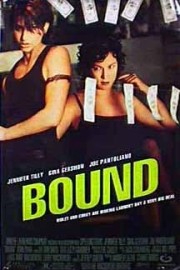Bound
It’s been 18 years since I’ve seen the Wachowski’s first directorial effort, “Bound.” When I saw it, I was not a fan, and that lack of enthusiasm stayed with my opinion of the sibling’s films through the “Matrix” trilogy up until 2008’s “Speed Racer.” That’s when they started to get in my good graces, with their next film, “Cloud Atlas,” only solidifying the feeling that Lana and Lilly were something special. Overall, I don’t hate the “Matrix” movies, but I definitely don’t love them, especially the first one, like others do. I’ve always wanted to revisit “Bound,” though, to see if my original feelings on the film were wrong.
Given how big and bold the Wachowskis have gotten in their later films, “Bound” is very much an anomaly in their filmmography. Rather than a large-scale action thriller, it’s a small-scale modern film noir about an ex-con (Corky, played by Gina Gershon) who is doing maintenance work in the same building as Violet (Jennifer Tilly) and her husband, Caesar (Joe Pantoliano). Caesar works for the mob, and Violet is a trophy wife who didn’t realize how deep she got into danger until it was too late. Violet and Corky have an instant connection, and they act on that connection almost immediately. They also hatch a scheme: an associate of Caesar’s has stolen $2 million dollars. Caesar is bringing it back to the apartment to count it, and find out how he did it. Violet and Corky plan on stealing the money and running. The question is whether the plan will work. I’ve seen enough movies like this to know the answer to that.
I think one of the things that didn’t work for me when I saw the film originally was how obviously the performances basically hit the film noir marks in terms of line readings from the Wachowskis’s screenplay. This film touches on the familiar tropes of the genres it’s playing in, and it feels pretty obvious what will happen. What distinguishes the film, however, is the style. This wasn’t as clear to me in 1997 as it is now. The film hints at many of the same visual and sonic ideas the Wachowskis would perfect and finesse in the “Matrix” films, with their collaborations with cinematographer Bill Pope and composer Don Davis baring rich fruits. This is a delirious, delicious thriller that worke precisely because it takes the genre to it’s extremes in terms of tone. There are times when the film is an absurd black comedy, and others when it’s a sensual erotic thriller. Mostly, though, it plays within the rules of the genre, but in a way that is wickedly fun. The Wachowskis understand pulp and genre well, and hopefully, while I’m a big fan of their recent trajectory as filmmakers, it’d be nice to see them going small and slick for a little change of pace.
What really makes “Bound” work, though, are the performances. The Wachowskis and their filmmaking is the main star of the film, why it really succeeds as well as it does, but the performances (as obvious as they seem at times) bring the film to life in a genuinely impactful way. As Caesar, Pantoliano does his weasily bad guy, but not so bad a guy, act, and does it well. It’s Tilly and Gershon that really make the film purr, though. Tilly is adept at playing characters that are smarter than they seem– that unique voice of hers just makes us feel like she’s a dunce with a remarkable body, but she’s not as dumb as anyone thinks. And Gershon is a great tomboy, a mix of toughness and raw sexuality that makes it easy to see why Violet is so enamored with her. And when they get together, the movie heats up big time. The Wachowskis don’t rely on girl-on-girl action, though– that’s relegated to the first half an hour –as it’s the chemistry between the characters as they hatch their scheme that keeps us watching. We want them to succeed, and want Caesar to pay. That it ends up that way (spoiler alert) makes “Bound” a crowd-pleaser in every way, shape, and form, even if it took me a while to realize it.










